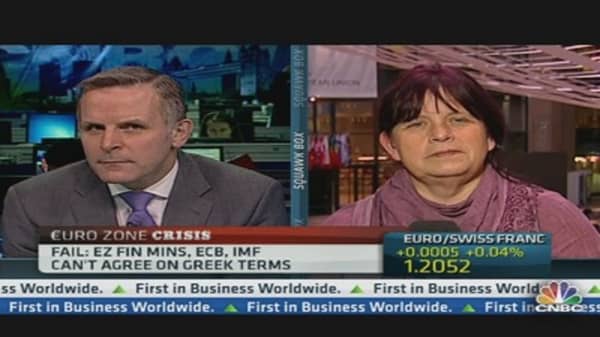Greece's international lenders once again failed to reach an agreement on how to bring down its debt levels, delaying the release of vital aid to Athens and pushing the euro lower. Yet all is not lost for Greece and the single currency, analysts told CNBC.
News that the euro zone finance ministers, the International Monetary Fund and the European Central Bank would resume talks on Monday knocked the euro down to $1.2750, about 0.6 percent below a two-week high set on Tuesday amid optimism about a deal on Greece.
Progress was made on a package of measures to reduce Greece's public debt, but more technical work was needed, said Jean-Claude Juncker, chairman of the Eurogroup of finance ministers. The meeting began late on Tuesday and dragged into the night.
Currency analysts said the delay of an announcement on Greece was likely to be a temporary set-back for the euro, since expectations that funds to Greece would be unlocked remained in place.
"The fact that they (the finance ministers) can talk for over 11 hours and not reach an agreement is a bit disappointing," said Sean Callow, senior currency strategist at Westpac in Sydney. "But we won't see a collapse in the euro and it should start to creep back up on hopes that a deal will be reached."
Ray Attrill, co-head of foreign exchange strategy at National Australia Bank, agreed.
"For me, the fact that a decision is not being reached today doesn't mean that we're close to failure. It means that we're going to get an agreement come hell or high water," he told CNBC Asia's "Cash Flow."
Greek debt can fall to below 120 percent from the current 170 percent of gross domestic product by 2020 only if euro zone members accept losses on their loans to Greece, allow further financing or force private creditors to sell Greek debt at a discount, Reuters reported on Wednesday, citing a document prepared for the EU finance ministers meeting.
Where Next?
Currency analysts said the focus for markets was whether Greece would secure emergency loans and any announcement that Athens would be granted a loan of up to 44 billion euros ($56.3 billion) could boost the euro up to the $1.29 to $1.30 range.
"The euro's move is likely to be positively correlated with the amount of money that Greece gets," said Westpac's Callow. "Anything below 44 billion euro would be met with disappointment by the market."
If the EU unlocks aid, Greece is expected to receive the funds by early December.
"On a deal, there's a potential for the euro to shoot back up, certainly above $1.30 and even challenge that previous $1.3172 high," said NAB's Attrill. "So obviously if the deal doesn't get done, it will be calamitous in the short-term, but I think we're a long way from concluding that that is likely at this stage."
But Macquarie Bank's head of strategy for fixed income and currencies, Nizam Idris, said that even with a resolution to the Greece aid problem, weak economic growth in the euro zone would continue to weigh on the single currency.
"The euro's problems are bigger than Greece. Europe is in recession and the fundamentals are weak, so I am negative on the euro," he said.
(Read More: "Grexit" could spark global economic crisis: German think tank)
—By CNBC's Dhara Ranasinghe; Follow Her on Twitter @DharaCNBC





